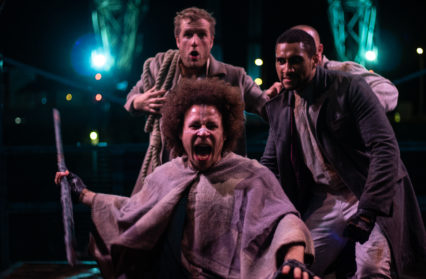Phil Morris reviews Tin Shed’s production of Melville’s Moby Dick, which is an exercise in more than just spectacle, with vulnerable and memorable performances on the part of the actors.
Tin Shed has been an integral part of Newport’s small, underfunded, though raw and vital theatre scene for about half a dozen years. After graduating from the city’s university, Georgina Harris and Justin Cliffe have continued to plough their own idiosyncratic furrow of anarchic comedy happenings and quirky literary adaptations, which has won for them an enthusiastic, and notably youthful local following. So it’s only fitting that for their most ambitious production to date, Tin Shed selected Newport’s iconic Transporter Bridge as a venue for a site-specific spectacular that celebrates the unheralded lives of hard-working men who once put their lives on the line in order to make a living. The bridge has long been a totem of civic pride, a testament to a time of former industrial might and full-employment – it now haunts the city skyline like one of the phantoms that populate Melville’s ultimate fish-that-got-away story. By staging Moby Dick on a gondola, dangling metres above the murky River Usk, Tin Shed not only conjure up the moody atmospherics of a ship at sea, they also pay homage to their home city’s past in a manner that valorises manual labour – linking the tough whalers of Nantucket to the hard dockers of Newport through the near-ceremonial heaving and rattling of chains, and the grim mirth of working-class fatalism.
This adaptation of Moby Dick begins rather unsteadily in the nearby Waterloo Hotel, where one of the community actors from Pill delivers an encomium to the Transporter Bridge that comes perilously close to a heritage centre aesthetic. As the gondola makes its first crossing over the river to arrive at Nantucket, we’re greeted by more community actors in full Pirates-of-the-Caribbean mode, arghing and cursing like the saltiest of sea dogs. It’s a rather fun episode, but it smacks too much of a jolly-rogered good time, which strays somewhat from the novel’s biblical sense of the epic.
The drama, however, picks up considerably once the Pequod sets sail on its doomed quest for the great white whale, captained by an appropriately sepulchral-looking Jared Morgan as the fanatical Ahab. It’s during this hour-long section of the show, suspended in the cold October air, with a bitter wind whistling up the Usk estuary, that the gloom of night becomes all-pervasive. The steel cables of the Transporter Bridge evoke the ropes of a ship’s rigging, and the tolling bell of its engine house sounds out like a warning through the densest of fogs.
A committed cast of professional actors convinces as a ship’s company, trading barbs of macho wit and executing their work duties with impressive physicality. No attempt at a New England accent is made, but this does not compromise the show’s credibility, rather it affirms the key image of the production. It doesn’t matter if these men are from New England or Newport – they are the working men of centuries past, phantoms consigned to a forgotten history.
The substantial achievement of Tin Shed’s Moby Dick is that the production doesn’t rely on its unusual setting to establish a sense of creeping doom. The production may be defined by the towering figure of the bridge, yet it never loses sight of the human scale. The lead actors, particularly Morgan as a surprisingly vulnerable Ahab, work hard to ensure the whole venture doesn’t become a mere exercise in spectacle. To create a stage version with a manageable running time, much of the novel’s symbolic complexity and mythic power has been jettisoned. It still packs an almighty punch, however, in a conclusion that renders the utter horror of human folly in all its self-destructive futility.
As in the best examples of site-specific theatre – and in spite of some earlier missteps – Tin Shed’s Moby Dick successfully reimagines Melville as it re-examines a familiar historical landmark, enabling its audience to regard both with a fresh perspective and deeper understanding. It is clearly a labour of love, and the culmination of an enduring relationship between Tin Shed and the rough old city they call home. Moby Dick represents a significant step forward for this company, logistically and artistically it is an impressive piece of work, one that indicates that they’re now poised to gain wider recognition across Wales. Tin Shed not only utilises every aspect of theatricality in order to fulfil its artistic vision, it is a company that thinks carefully about what is has to say and how to say it. The time has come to support its future efforts with a substantial touring opportunity so that Wales can learn what Newport has already known for some time.
Moby Dick runs in Newport until Oct 16th.
You might also like…
Avid Wales Arts Review contributor Jon Gower casts a critical eye over Horatio Clare‘s Down to the Sea in Ships, a novel inspired by the famous Moby Dick.
Phil Morris is a regular contributor to Wales Arts Review.












